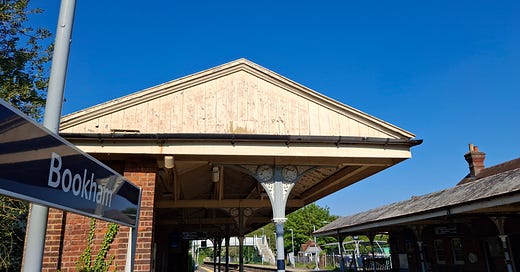I was in Bookham last week. It’s always a wonderful place to be. Unusually (and gloriously) I also had to catch the train into London from Bookham Station, a place of huge importance in English literary and theological history. It was here that C.S. Lewis stepped off the train as a teenager. It was here, in Bookham, that his life was changed. I’ll let Lewis himself tell the story but, first, let’s go for a walk.
When I said “iconic,” I really meant “idyllic” but the excitement of the occasion got to me. So much so, that I turned round and walked in the other direction:
That was me. This is C.S. Lewis himself, in Chapter 9 of Surprised by Joy, the chapter called ‘The Great Knock’:
On a September day, having crossed to Liverpool and reached London, I made my way to Waterloo and ran down to Bookham. I had been told that Surrey was “suburban,” and the landscape that actually flitted past the windows astonished me. I saw steep little hills, watered valleys, and wooded commons which ranked by my Wyvernian and Irish standards as forests; bracken everywhere; a world of red and russet and yellowish greens.
Then came the fateful meeting:
At Bookham I was met by my new teacher - “Kirk” or “Knock” or the Great Knock as my father, my brother, and I all called him. […] He was over six feet tall, very shabbily dressed (like a gardener, I thought), lean as a rake, and immensely muscular. His wrinkled face seemed to consist entirely of muscles, so far as it was visible; for he wore moustache and whiskers with a clean-shaven chin like the Emperor Franz Joseph.
So much for the Great Knock’s looks. What about his words?
We shook hands, and though his grip was like iron pincers it was not lingering. A few minutes later we were walking away from the station.
“You are now,” said Kirk, “proceeding along the principal artery between Great and Little Bookham.”
I stole a glance at him. Was this geographical exordium a heavy joke? […] I said I was surprised at the “scenery” of Surrey; it was much “wilder” than I had expected.
“Stop!” shouted Kirk with a suddenness that made me jump. “What do you mean by wildness and what grounds had you for not expecting it?”
[…]
Having analyzed my terms, Kirk was proceeding to deal with my proposition as a whole. On what had I based (but he pronounced it baized) my expectations about the Flora and Geology of Surrey? Was it maps, or photographs, or books? I could produce none. It had, heaven help me, never occurred to me that what I called my thoughts needed to be “baized” on anything. Kirk once more drew a conclusion - without the slightest sign of emotion, but equally without the slightest concession to what I thought good manners: “Do you not see, then, that you had no right to have any opinion whatever on the subject?”
By this time our acquaintance had lasted about three and a half minutes; but the tone set by this first conversation was preserved without a single break during all the years I spent at Bookham. […] Some boys would not have like it; to me it was red beef and strong beer.
It was on this same train line that Lewis had another fateful encounter: this time with the work of George MacDonald. But I’ll leave that to another post. If nothing else, it will give me an excuse to take the train to Bookham.
P.S. For any readers not in the UK, I would also like briefly to mention that, as the photograph suggests, the sky is always that particular shade of blue in England, and the sun always shines.




